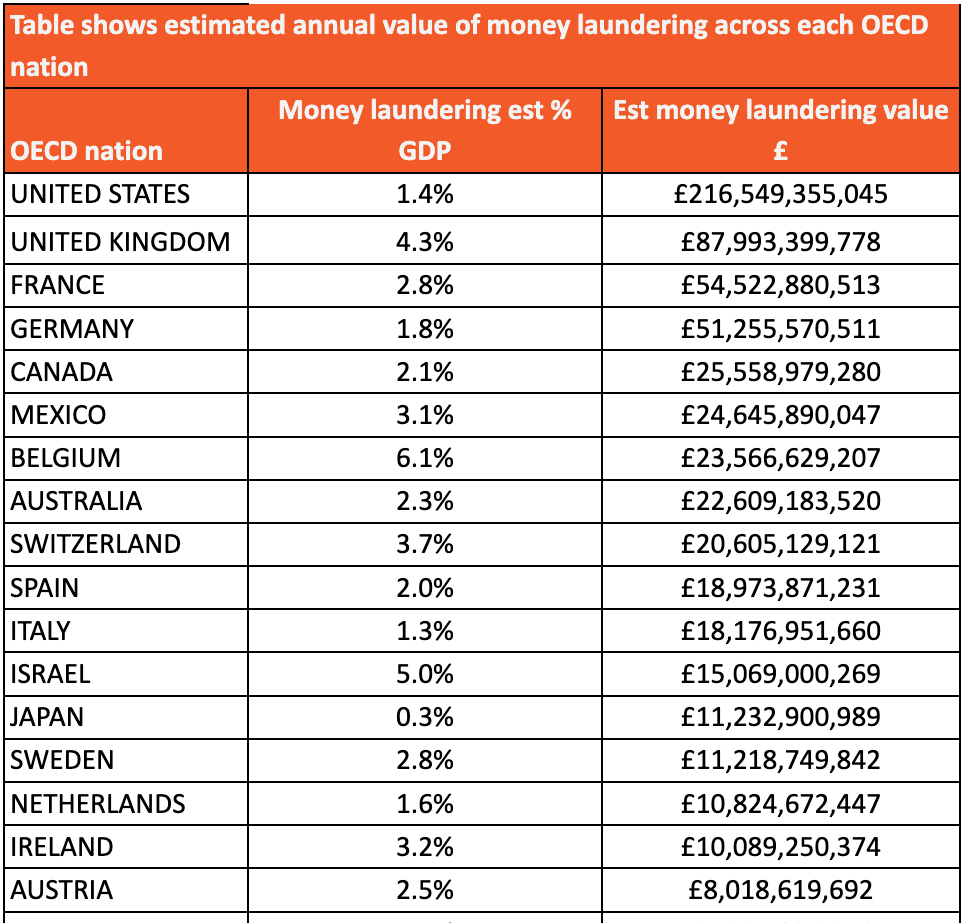Compliance
US, UK Are Top Global Money Laundering Hotspots

The UK and US top the list of global money laundering hotspots, with experts maintaining that prevention is better than cure for the global scourge.
The UK ranks second among global money laundering hotspots, with
an estimated £88 billion ($119 billion) laundered each and every
year.
In the US, the figure stands at £216.5 billion laundered every
year, by far the highest sum among OECD (Organisation for
Economic Co-operation and Development) countries.
It is estimated that worldwide, the total sum of money laundered
annually equates to as much as 3 per cent of global GDP – a
huge £1.8 trillion, according to new figures from identity
verification service Credas.
Among OECD member states, the sum of money laundered in the UK is
estimated to sit at 1.9 per cent of GDP, although this climbs as
high as 6.1 per cent in Belgium, with the UK sitting fourth in
the table at 4.3 per cent. However, when taking the GDP of each
nation into account, the UK jumps to second in the table, with
this 4.3 per cent of GDP equating to a huge £87.9 billion of
money being laundered annually.
France (£54.5 billion), Germany (£51.3 billion) and Canada (£25.6
billion) also rank within the top five. In contrast, Iceland
sits at the bottom of the OECD rankings, with just £370
million in money laundering value, followed by Estonia
(£703.4 million) and Latvia (£750 million).
“The practice of money laundering is as old as the hills and it’s
one area of criminal activity that is incredibly tricky to
eradicate as it can be done in such a vast and varied number of
ways,” Tim Barnett, chief executive officer of Credas
Technologies, said. “It’s also a practice that continues to
evolve with the times and in more recent years we’ve seen
criminals utilise online banking, cryptocurrencies and, most
recently, NFT marketplaces, in order to wash dirty cash."
"Prevention is always better than cure and our technology is
deployed the length and breadth of the nation and across a
multitude of sectors to ensure that businesses are safeguarded
against this illegal activity," he added.
There have been a series of global money laundering scandals,
including the worst one in Asian financial history, 1MDB, which
resulted in Singapore removing the local licences of two
banks – BSI and Falcon Private Bank. Just this week a former
Goldman Sachs banker has gone on trial accused of
misappropriating more than $2.7 billion dollars from the
Malaysian fund, embezzling the money to purchase luxury real
estate and art, as well as to finance Hollywood films.
Separately, the UK’s financial watchdog fined NatWest £264.7
million in December for failing to follow AML regulations.
Money laundering is measured in trillions of dollars, creating a
headache for banks and other intermediaries. The amount of money
laundered annually stands at $1.6 to $2 trillion; less than 1 per
cent of this laundered money is traced, according to New
York-based Broadridge Financial Services.
As a result, banks spend a lot of money on regulatory technology to ensure that their onboarding, KYC and anti-money laundering procedures are rigorous and fit for purpose. But many wealth management firms are still over-reliant on manual compliance checks for processes such as KYC and anti-money laundering, and have no plans to automate, according to LexisNexis Risk Solutions.